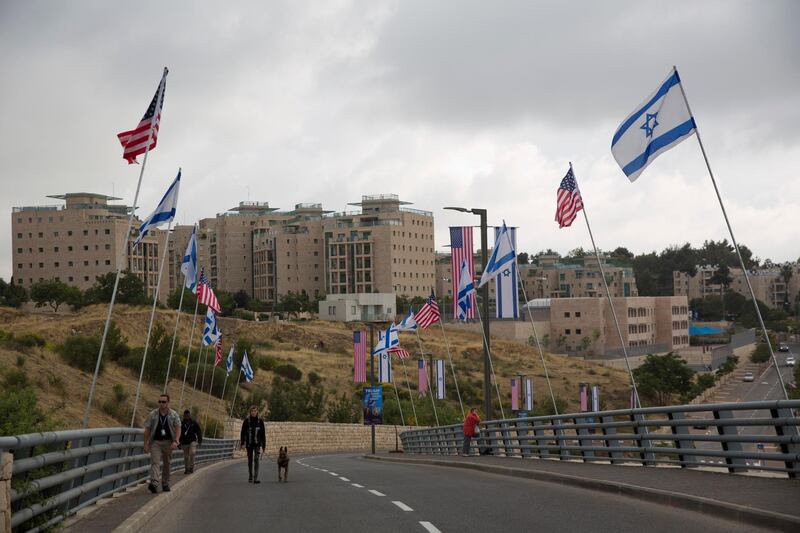The international rejection of United States President Donald Trump’s decision to withdraw from the Iran nuclear deal last week has given the Palestinians a new “source of hope”, according to a senior adviser to Palestinian President Mahmoud Abbas, as Israeli moves and the relocation of the US embassy to Jerusalem appeared to have dealt major blows to their hopes of statehood.
"The only feeling of optimism is based on the fact that the US is no longer the sole owner of the universe," Nabil Shaath, former chief Palestinian negotiator told The National in a phone interview.
“There are now other powers making the world more multipolar”.
The five other parties to the deal - Germany, France, Britain, Russia and China - have indicated they will seek to salvage the 2015 agreement that traded the lifting of sanctions for limits on Tehran’s nuclear programme.
Their dismissal of Mr Trump’s unilateral action last week has shown that the international community is now willing to say “no” to the United States, the sole global superpower, said Mr Shaath.
As a result of their rejection, Iranian Foreign Minister Javad Zarif is embarking on a diplomatic tour to Beijing, Moscow and Brussels at the same time the US is scheduled to host a ceremony to move its mission in Israel from Tel Aviv to Jerusalem, becoming the first country to do so since the 1980s.
But Mr Trump and his hawkish administration, which includes three Middle East envoys with strong ties to Israel, have forged ahead with the embassy move in the face of Palestinian anger. He has also cut funding to UNRWA, the UN body that supports Palestinian refugees, plunging the body into the most severe crisis in its history.
Palestinian officials have nixed any contact with US officials in protest at the move. They must now rely on the wider international community, some of them key US allies, such as France and Britain, for diplomatic support.
“They feel that the US abandoned its commitments. The US is [now] a rich pariah state,” Mr Shaath, once the Palestinian chief negotiator, continued.
“From a total monopoly, into some sort of multilateralism that is really beginning to show. I think what happened on the Iranian issue is one of the indications that this is happening. That is a source of hope for the Palestinians”.
_____________
Read more:
Gaza protester wounded in final week of border demonstrations
UN slams Israel's deadly force in Gaza
______________
Mass Palestinian protests are expected in the West Bank and the Gaza Strip as Mr Trump does away with decades of US foreign policy, moving the mission a day before the 70th anniversary of the day that the Palestinians consider to be their “catastrophe”, known as the Nakba - the displacement of 700,000 Arabs after the creation of the state of Israel in 1948.
Palestinian leaders and their Arab counterparts had warned the US president against moving the embassy for fear of inflaming the Arab streets, as well as dealing a further blow to the already moribund peace process.
Jerusalem is a city revered by Christians, Muslims and Jews. The Noble Sanctuary, or Haram Al Sharif, is the third-holiest site in Islam. It lies in East Jerusalem, the territory that Palestinians seek for any future state, but that Israel annexed in the 1967 Israeli-Arab War.
Mr Shaath briefed reporters in front of the site of the new embassy on Thursday, calling for a boycott of all ceremonies related to its opening as well as protests against Mr Trump's decision. Only Guatemala and Paraguay have followed suit in announcing embassy moves to the holy city.
“The protests will continue. It’s basically a non-violent expression of Mr Trump and his ideas,” he said.
Speculation has surfaced in the Israeli media that Mr Trump is planning a counter to the embassy move, requesting that Israel withdraw from four East Jerusalem neighbourhoods. But the Palestinians will refuse to countenance any of Mr Trump’s offers moving forward.
“We are not interested in the US as the sole broker. We are going for an international process and not for an American process,” he said, adding that Jared Kushner, Jason Greenblatt and David Friedman, Mr Trump’s three confidants on the Middle East conflict, are “not relevant” for the Palestinians anymore.
“The Security Council, the General Assembly, the International Criminal Court, there are many resorts”.
Mr Shaath reiterated that the Palestinians seek a non-violent resolution to the decades-long conflict, one that is based on the two-state solution, a sovereign Palestinian state living side-by-side with Israel.
But the president’s actions in Jerusalem have only revived memories of the day that the Palestinians will mourn 24 hours after the embassy move, according to Mr Shaath.
“What Trump is doing just reminds us of the ethnic cleansing that took place 70 years ago”.





